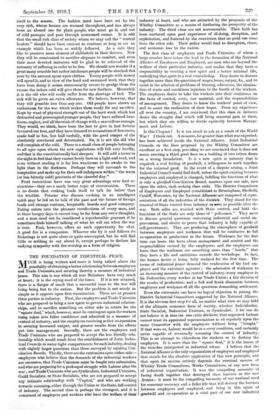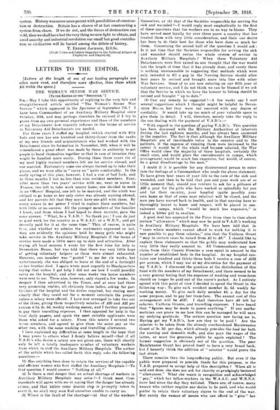ThE FOUNDATION OF INDUSTRIAL PEACE.
MUCH is being written and more is being talked about the possibility of obtaining a better relationship between employers and Trade Unionists, and securing thereby a measure of industrial peace. This aim is one which all true Britishers have very much at heart; it is the crying need of the times. If it is not attained, there is a danger of much that a successful issue to the war will bring being lost to the nation. But the problem is not nearly as simple as it appears upon first examination. There are at present three parties in industry. First, the employers and Trade Unionists who are prepared to bring a new spirit to govern industrial relation- ships, and to sacrifice something on either side in return fer the "square deal," which, however, must be contingent upon the workers being taken into fuller confidence and admitted to a measure of control of industry, and the employers receiving active co-operation in securing Increased output, and greater results from the efforts put into management. Secondly, there are the employers and Trade Unionists who are prepared to accept the less friendly rela- tionship which would result from the establishment of Joint Indus- trial Councils in water-tight compartments foreach industry, dealing with slightly larger questions than those surveyed by existing Con- ciliation Boards. Thirdly, there are the extremists upon either side— employers who believe that the demands of the industrial workers are excessive, that Trade Unionism must be fought into submission, and who are preparing for a prolonged struggle with Labour after the war ; and Trade Unionists who are Syndicalist's, Industrial Unionists, Guild Socialists, or State Socialists, who are not prepared to accept any intimate relationship with " Capital," and who are working towards assuming, either through the Union or the State, full control of industry. The second class is perhaps the strongest, and it is composed of employers and workers who have the welfare of their
industry at heart, and who are attracted by the proposals of the Whitley Committee as a means of furthering the prosperity of the industry. The third class are not unreasonable. Their faith has been nurtured upon past experience of ill-doing, deception, and exploitation, and fostered by the conviction that no good can come from the other side. Their policy would lead to disruption, chaos, and economic loss to the nation.
The first class of employers and Trade Unionists, of whom a large number have taken the lead in the formation of the National Alliance of Employers and Employed, are men who see beyond the welfare of their particular industry, and realize that they have a responsibility in creating a new spirit and a better national life, embodying that spirit in a real comradeship. They desire to discuss together more than the questions of wages, hours, output, &c., and to assist in the solution of problems of housing, education, the elimina- tion of waste and conditions injurious to the health of the workers. The employers desire to take the workers into their confidence on the facts of control, costs, raw material, and the responsibilities of management. They desire to know the workers' point of view, and to assist the realization of their hopes. From my experience all over the country, I am convinced that this class in industry desire the straight deal which will bring material gain to them, but which they are willing to divide equitably between Manage- ment and Labour.
Is this Utopian ? Is it too much to ask as a result of the World War ? I think not. A measure, far greater than what was expected, has been achieved inside the National Alliance. Joint Industrial Councils on the lines proposed by the Whitley Committee are excellent as a first step, providing we are convinced that it does not mean erecting a third good floor on a building of two rotten floors on a wrong foundation. It is a new spirit in industry that is required, a real feeling of goodwill, a willingness to work together for the national good. In the event of a dispute arising, a Joint Industrial Council would find itself, unless the spirit existing between employers and employed is changed, fulfilling the functions of what is only a glorified Conciliation Board, masters upon one aide, men upon the other, each seeking class ends. The District Committees of Employers and Employed (established in Birmingham, Sheffield, Cardiff, Worcester, by the National Affiance) are composed of repre- sentatives of all the industries of the district. They stand for the removal of State control from industry as soon as possible after the war. Both sides are wearied with State control, and hold the functions of the State are only those of " policemen." They meet to discuss general questions concerning industrial and social im- provement, and desire to prove that industry is fully capable of self-government. They are producing the atmosphere of goodwill between employers and workmen that will be conducive to full co-operation in production in the future. Workmen for the first time can learn the facts about management and control and the responsibilities carried by the employers; and the employers can learn that the workmen are something more than " hands," that they have a life and ambitions outside the workshops. In fact, the human factor is being fully realized for the first time. The terms of industrial peace demand the eradication of the bad em- ployer and the extremist agitator ; the admission of workmen to an increasing measure of the control of industry, every employer in his Federation, every worker in his Trade Union; a fair division of the results of production; and a full and frank discussion between employers and workmen of all the questions demanding settlement.
Even the extremists can have no logical objection to joining the District Industrial Committees suggested by the National Alliance. It is the obvious first step for all, no matter what view we may hold of the ultimate economic form of society, whether Individualist, State Socialist, Industrial Unionist, or Syndicalist. I for one do not believe it is tree (as one critic declares) that organized Labour cannot trust its appointed representatives to sit regularly upon the same Committee with the employers without being " bought." If that were so, Labour would be in a sorry condition, and certainly never capable of eventually assuming the control of industry. This is no attempt to chloroform the workers or to destroy the employers. It is more than the " square deal," it is the lesson of the trenches interpreted in industrial terms. I believe that the National Alliance is the only organization of employers and employed that stands for the absolute application of this new principle, and that upon its success entirely depends the eventual success of Whitley Trade Committees, Works Committees, or any new form of industrial organization. It was the compelling necessity of facing death together that destroyed class barriers in the new Armies ; it must be the compelling necessity of our national need for economic recovery and a fuller life that will destroy the barriers between employers and employed, and bring in this spirit of goodwill and co-operation as a vital part of our new industrial
system. History was never more potent with possibilities of construc- tion or destruction. Britain has a chance of at last constructing a system from chaos. If we do not, and the forces of destruction run wild, then we shall have lost the very thing we now fight to obtain, and amid anarchy and industrial revolution our small but good contribu- tion to civilization will lie buried among the debris of history.
T. ERNEST JACKSON, D.S.Sc.
(Trade Union and Labour Organizer to the National Alliance of Employers and Employed).



























 Previous page
Previous page